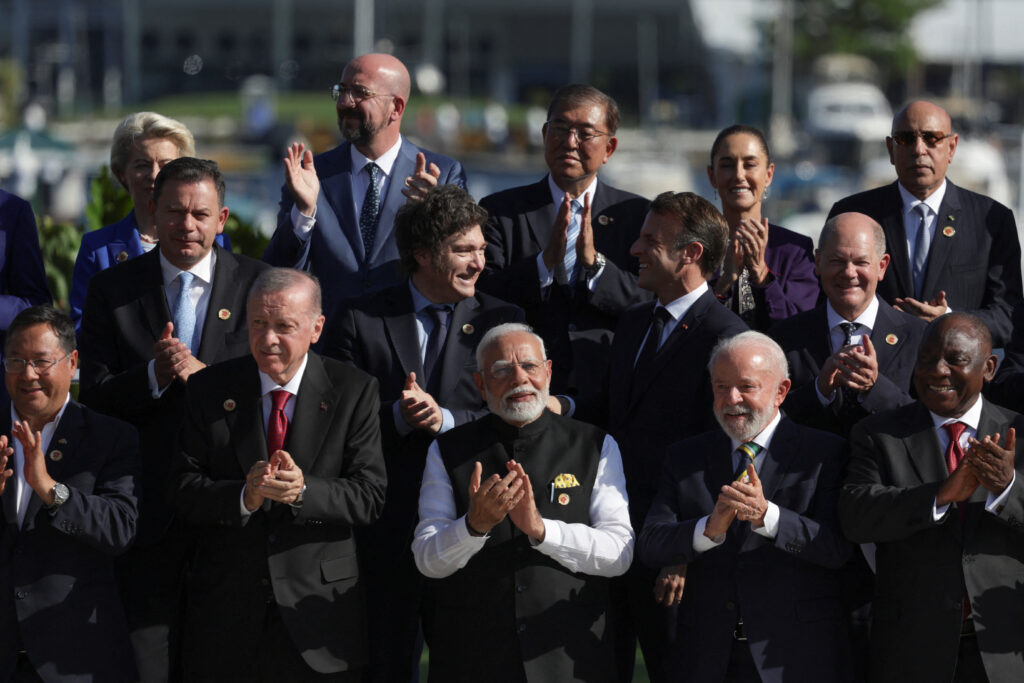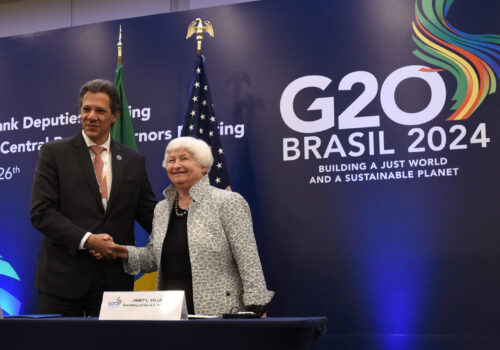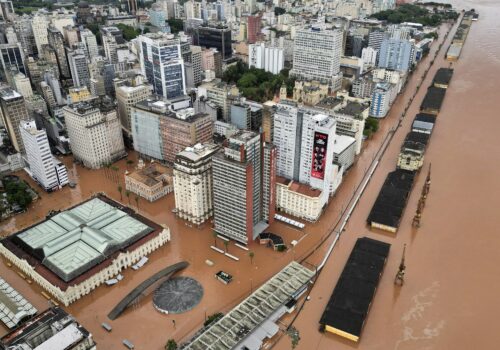Latin America is taking center stage in global affairs this month as world leaders visited Brazil and Peru for the Leaders’ Summit of the Group of Twenty (G20) and the Asia-Pacific Economic Cooperation (APEC) forum. It does so, however, as disparate national priorities among the region’s G20 members—Argentina, Brazil, and Mexico—stand in the way of articulating a common agenda. Developments in Europe and looming political change in the United States present added challenges that may thwart some of the shared, yet limited, regional objectives.
Eight Latin American countries attended this year’s G20 leaders’ summit. Besides Argentine President Javier Milei, Brazilian President Luiz Inácio Lula da Silva, and newly inaugurated Mexican President Claudia Sheinbaum, delegations from Bolivia, Chile, Colombia, Paraguay, and Uruguay traveled to Rio as guest countries of the Brazilian G20 presidency. These countries face shifting international winds and are growing apart as governments respond in different ways to external developments, from growing US-China competition to the incoming US presidential administration.
Brazil’s G20 marks the third year in a row in which an emerging market is setting the G20 agenda, following the presidencies of Indonesia (2022) and India (2023). In this context, these countries have paved the way for greater harmonization of objectives between developed and developing countries, pushing for progress in key areas, including climate finance, hunger and poverty, digital public infrastructure, and reforming international financial institutions. Over the same period, Latin American G20 members have worked together to raise the importance of regional priorities, such as development and climate finance and the reform of multilateral institutions. This year, however, policy coordination has become more challenging as governments veer apart from one another in how they plan to adapt to a changing international landscape, risking a division of the region into competing groups.
Here is how the three Latin American countries in the G20 approached this year’s summit.
Brazil
Brazil faced the challenging task of balancing the disparate demands and priorities of all twenty-one permanent members of the G20 with its own priorities: social inclusion, global reform, and sustainability. The end goal, the successful signing of a (nonbinding) final declaration, was a complex task in a heavily divided world, and key Brazilian priorities such as promoting a billionaire tax to finance hunger relief faced opposition from the United States. The proposal, which was supported by France, Spain, and South Africa, was actually most vehemently opposed by fellow South American nation Argentina. Brazil ultimately succeeded in gaining consensus for a declaration that espoused its key objectives, including calls for multilateral reform, cooperation for more effective taxation of “ultra-high-net-worth individuals,” and a redoubling of efforts to end world hunger and fight climate change, among other topics.
Yet Brazilian leaders are also aware that they will have more opportunities beyond the G20 to shape the agenda. Next year, the Lula administration will host the 2025 United Nations Climate Change Conference (COP30) and will preside over the BRICS summit. It will be an important year for international climate negotiations that coincides with President-elect Donald Trump’s first year back in office, which has raised uncertainty about the United States’ continued participation in the Paris climate accords. This sentiment was perhaps best exemplified by Lula himself, who concluded in his final remarks that leaders had “worked hard,” but that they had “only scratched the surface of the deep challenges that the world has to face.”
Mexico
Under Sheinbaum, Mexico is reemerging as a more active participant in the G20 process and the world stage. This is the first time a Mexican president has attended the G20 in six years, ending that country’s limited presidential diplomacy under former President Andrés Manuel Lopez Obrador. During her participation, Sheinbaum signaled support for three areas of focus: gender equality, sustainable development, and digitalization. She also supported Brazil’s proposed Global Alliance against Hunger and Poverty—which was a high mark of the Brazilian presidency—and presented the Sowing Life program to divert 1 percent of global military spending to sustainable development and reforestation.
Mexico’s return to international fora pleased domestic and international observers, and images of Sheinbaum in meetings with world leaders have set a clear break from her predecessor. However, Mexico’s deep ties to the US economy present a different calculus for the Mexican president when compared to Lula for 2025 and beyond, likely inspiring greater caution in her approach to the international arena, particularly as she prepares her country for potential confrontation with the incoming administration in the United States. She did nonetheless use the stage to defend the government’s controversial judicial reform. Her first major international appearance in Rio de Janeiro set the stage for how she plans to move forward in years to come.
Argentina
The main source of regional misalignment among the three Latin American G20 members came from Argentina, which in past days had made a series of symbolic gestures at the United Nations (UN) to signal the country’s new course under Milei. The country had stood out as the sole vote against UN resolutions this month on indigenous people’s rights and combating gender-based online violence. Argentina also recalled its delegation from the ongoing COP29 in Azerbaijan, raising concerns over the country’s continued commitment to the Paris agreement and the international climate regime, echoing Trump’s own withdrawal of the United States from the agreement in 2017. (Milei was also the first foreign leader to visit Trump on the Thursday following the US presidential election.)
Brazil was quick to respond through Environment Minister Marina Silva and Vice-President Geraldo Alckmin, who criticized Argentina’s move. In Brazil, there was also apprehension that these moves by its southern neighbor set a bad precedent for what may happen during the leaders’ summit. Across negotiations over the G20’s final declaration, Argentine representatives sought to block the inclusion of references to gender equality, women’s rights, a tax for billionaires, and the 2030 Agenda for Sustainable Development. In the end, Milei decided not to block the leaders’ declaration but dissociated himself from those issues. An official involved in the negotiations told the Associated Press that Argentina adopted the statement “under intense pressure from world powers.” Other areas, such as the promotion of regional democracy, artificial intelligence governance, and the energy transition, fared better in exchanges over the communiqué. Underscoring the tensions between Brasilia and Buenos Aries, Argentina is the only country not to have requested a bilateral meeting with Lula in Rio.
Trade, Trump, and beyond
Developments in Europe are also changing diplomatic calculations in the region. For months, it was expected that the long-delayed trade deal between the European Union (EU) and Mercosur, a South American trade bloc, might finally be announced by European Commission President Ursula von der Leyen and her Mercosur counterparts during the G20 leaders’ summit. Brazil’s invitation of Paraguay and Uruguay, the bloc’s other members together with Argentina (plus Bolivia, which is completing its accession process), was partially inspired by this objective. France, however, has made its opposition to the agreement clear: French Prime Minister Michel Barnier warned last week that the government is “employing all means” to block it in its current form. French President Emmanuel Macron, who faces a steep legislative battle over France’s 2025 budget and is being pressured by farmers to block the deal, met Milei in Buenos Aires this past Sunday before traveling to Rio. After that meeting Maron told reporters that Milei “was not satisfied with the deal” and that he was “not satisfied with the way Mercosur worked.” Other EU members, including Austria, Hungary, Ireland, and Poland, may also step in to block the deal. Interestingly, French officials explained that Macron played an instrumental role to convince Argentina “to contribute to the international consensus” and refrain from blocking the G20 process.
Ultimately nothing transpired in Rio, although the agreement’s main proponents, including Germany, Spain, the Mercosur countries, and the European Commission, remain optimistic that significant progress may still be reached before the end of the year. This would constitute one of the largest trade agreements in history and would bring the two regions closer at a time when fears of renewed trade wars and higher tariffs are spooking international markets. Nevertheless, there is also concern that Argentina’s withdrawal from COP29 may still be used by the deal’s detractors in the EU to block progress over environmental policy, similar to how deforestation in Brazil has fueled anti-treaty momentum in previous years. European officials, including Kaja Kallas, the leading candidate to become the next high representative of the EU for foreign affairs and security policy, have made clear their belief that if the deal fails it will create a “void” that will be filled by China.
Meanwhile, Beijing presented a clear framing for Chinese leader Xi Jinping’s participation in the G20: “to champion cooperation, multilateralism,” a strategy meant to preemptively present China as an alternative to Trump’s “America First” approach to international affairs. The inauguration of the port of Chancay in Peru and the announcement of new economic cooperation agreements with partners in Latin America and the Caribbean further cemented the perception of China’s outsized competitive advantage vis-à-vis the United States in its ability to deliver tangible economic results.
As the G20 leaders’ summit concludes, its leaders should redouble their efforts to find common ground and work together, or they will face the risk of having their shared interests being swept away by rising global uncertainty and volatility.
Ignacio Albe is a project assistant at the Atlantic Council’s Adrienne Arsht Latin America Center.
Further reading
Tue, Jul 30, 2024
Dispatch from Rio: Can Brazil set up the G20 leaders’ summit for success?
New Atlanticist By Ananya Kumar, Mrugank Bhusari
Brasília has sought to acknowledge fundamental disagreements on geopolitics between some members, and then to sidestep them entirely at the ministerial level. How long can this approach last?
Mon, Sep 9, 2024
Brazil 2050: A vision for global food security
Issue Brief By Valentina Sader, Peter Engelke
How can the world meet the growing demand for food while also adapting to climate change?
Tue, May 14, 2024
Brazil’s tragic floods should put climate adaptation at the top of the G20 and COP agendas
New Atlanticist By Valentina Sader
The ongoing flooding in Rio Grande do Sul is an example of the urgent need for countries to focus on adapting to climate change.
Image: Bolivian President Luis Arce, Portugal's Prime Minister Luis Montenegro, Turkish President Tayyip Erdogan, European Commission President Ursula von der Leyen, European Council President Charles Michel, Argentina's President Javier Milei, India's Prime Minister Narendra Modi, Japan's Prime Minister Shigeru Ishiba, French President Emmanuel Macron, German Chancellor Olaf Scholz, Mexico's President Claudia Sheinbaum and Brazil's President Luiz Inacio Lula da Silva applaud as they pose for a group photo at the G20 summit, in Rio de Janeiro, Brazil, November 18, 2024. REUTERS/Ricardo Moraes



